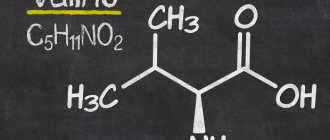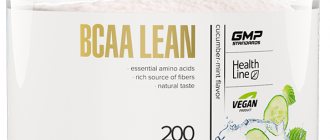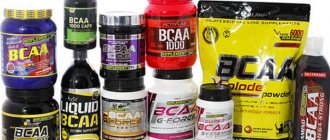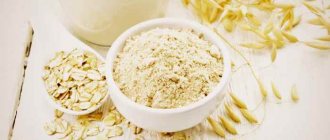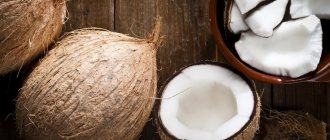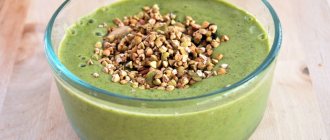A complex of essential amino acids is one of the most versatile and necessary sports supplements. BCAA contains leucine, its isomers are isoleucine and valine. What does this amino acid affect and what is its role in the body? Many supplements contain isoleucine either the least or equally with valine. Let's figure out why you should take supplements with this amino acid and what contraindications there are for taking it.
What role does the amino acid isoleucine play in the body?
Isoleucine is an essential amino acid with a branched side chain, which is not synthesized in the body independently, but only comes from food, is a component of many proteins and has anabolic properties, participating in energy metabolism.
Due to the special structure of the molecule, along with leucine and valine, the amino acid is part of the BCAA complexes (the abbreviation means “amino acids with branched side chains”).
If the body lacks leucine and valine, L-isoleucine is able to convert into these amino acids.
L-isoleucine is involved in the formation of red blood cells in the blood, energy metabolism and glucose utilization. The amino acid is metabolized in the muscles.
In medicine, L-isoleucine in drugs is used for:
- Treatment of asthenia.
- Preventing Parkinson's disease and cardiovascular diseases.
- Treatment of muscular dystrophy.
- Rehabilitation after injuries and operations.
- Treatment of inflammatory and acute bowel diseases.
Replaceable and essential amino acids
Details Author: LDC Neuron Published: November 10, 2015
For normal functioning and vital activity, our body must regularly replenish its reserves of vitamins, minerals and nutrients, which are responsible for the functioning of internal organs and the course of various internal processes. Amino acids are among the most important substances that each of us needs. They are organic compounds that contribute to the formation of protein molecules, which are the basis of muscle tissue and are responsible for metabolic processes in the body.
In terms of importance and quantity in the human body, amino acids occupy second place after water, so do not underestimate them. To avoid undesirable consequences, it is necessary to regularly replenish amino acids in the body and promote their production, depending on the type.
What foods contain isoleucine?
Isoleucine is found in large quantities in animal foods:
- Poultry meat, including chicken meat.
- Pork, beef, rabbit.
- Sea fish.
- Liver.
- Chicken and quail eggs.
- Milk, sour cream, kefir, cottage cheese.
- Hard cheese.
The amino acid can also be obtained from plant sources:
- Almonds, peanuts, cashews, chickpeas.
- Lentils, hummus, corn, soybeans.
- Rye, buckwheat, rice.
- Cabbage, greens.
- Bakery products, including Borodino bread.
Glycine
This nonessential amino acid got its name from the ancient Greek word “glycys”, which translates as “sweet” (the fact is that glycine has a sweetish taste).
The main purpose of glycine is to restore the nervous system, thereby normalizing mental activity in general. In addition, it is glycine that promotes the production of other amino acids and is part of the structure of hemoglobin.
Benefits of glycine
- Slows muscle tissue degeneration.
- Participation in the synthesis of DNA and RNA.
- Relieving nervous tension.
- Relieving attacks of aggression.
- Reducing the need for sweet foods.
- Improving overall well-being and lifting your mood.
- Increased mental performance.
- Stimulating the immune system.
- Binding and neutralization of toxic substances.
- Reduced alcohol dependence.
- Promoting the restoration of damaged tissues.
Important!
Glycine can be used for a long time, since this amino acid, even in large dosages, does not cause harm to health.
The human body synthesizes glycine itself, but some of this amino acid should still be replenished through food. Otherwise, the body will use up its own reserves of glycine, which will lead to weakness, exhaustion, sleep disturbances, and intestinal disorders (in severe cases, growth and development may be delayed).
What foods contain glycine?
The daily norm of glycine is about 3 – 6 g (depending on the intensity of physical and mental stress).
Products containing glycine:
- meat (beef and poultry);
- animal liver;
- gelatin and its by-products;
- fish (especially cod liver);
- chicken eggs;
- nuts (especially peanuts);
- cottage cheese;
- oats;
- seeds;
- buckwheat grain.
Why is L-isoleucine used in sports?
Why is the amino acid so popular in sports and used in BCAA complexes? This is because the amino acid is involved in the synthesis of new muscle fibers, which means it has anabolic properties. Due to the fact that the amino acid is broken down within 20-30 minutes and goes directly to the muscles, which need rapid recovery after heavy physical activity, and not to the liver. This explains why BCAAs, including L-isoleucine, are needed after and during exercise to further muscle growth and prevent catabolism.
Why do athletes need isoleucine?
During active sports, it is important that the growth of muscle tissue exceeds its degradation under load. Therefore, isoleucine helps athletes build muscle during mass gain. It increases the effectiveness of training and accelerates the achievement of the desired result.
For those who are trying to lose weight, or athletes who are cutting, when working on relief, isoleucine helps preserve muscles - here its anti-catabolic and energy functions come to the fore.
For all athletes whose diet suffers from a lack of complete protein, taking isoleucine will help maintain health, vigor and activity.
Benefits of amino acids
- Participates in the production of hemoglobin, affects blood quality, normalizes blood pressure.
- Promotes the growth and formation of new muscle fibers.
- Reduces blood sugar and cholesterol levels.
- Participates in energy metabolism, serves as a source of energy for muscles and brain.
- Prevents the destruction of muscle fibers.
- Regenerates damaged tissues.
- Increases endurance.
- Stimulates the work of the central nervous system and PNS.
- Increases immunity by producing hormones and enzymes.
- Promotes detoxification of the body.
Beneficial properties of isoleucine and its effect on the body:
- it regulates blood sugar levels;
- stabilizes energy supply processes;
- carries out hemoglobin synthesis;
- promotes muscle tissue restoration;
- increases the body's endurance;
- promotes rapid tissue healing;
- regulates blood cholesterol levels.
Interaction with other elements:
Isoleucine belongs to the group of hydrophobic amino acids.
Therefore, it does not mix well with water. At the same time, it interacts well with plant and animal proteins, which play an active role in the life support of the whole organism. In addition, isoleucine can be combined with unsaturated fatty acids present in sunflower and cotton seeds, almond seeds, peanuts, and olives.
Signs of isoleucine deficiency in the body:
- severe headaches and dizziness;
- irritability and fatigue;
- weakened immunity;
- depression;
- muscular dystrophy;
- hypoglycemia.
Signs of excess isoleucine in the body:
- blood thickening;
- increasing the concentration of ammonia and free radicals in the body;
- apathy;
- allergic reactions.
People suffering from kidney and liver diseases should not get carried away with supplements containing this amino acid!
Isoleucine for beauty and health
As mentioned earlier, isoleucine takes an active part in the higher nervous activity of our body. At the same time, it not only regulates a person’s energy potential, but also provides our body with the ability to regenerate. It is this condition that allows isoleucine to be classified as an amino acid responsible for maintaining the health and beauty of the entire body. After all, healthy, elastic skin, strong nerves and a radiant look are the main signs of the health of our body.
Attention! The information is for informational purposes only and is not intended to make a diagnosis or prescribe treatment. Always consult a specialized doctor!
Tatyana Eliseeva chief editor of the Food+ project
Ask a Question
Rating:
7.8
/10
Votes: 3
Material usefulness 6.5
Reliability of information 0
Formatting of Article 9
Side effects and harm
- In rare cases: allergic reactions - eczema, dermatitis, conjunctivitis.
- Amino acid intolerance: nausea, vomiting, sleep disturbance, headache, fever.
- An overdose of the substance causes nausea, vomiting, organic acidemia, a specific smell of sweat and urine, convulsions, respiratory and heart rhythm disturbances, and renal failure.
- Apathy, blood thickening, increased ammonia levels and general poisoning of the body are possible.
Contraindications
- Impaired excretion of isoleucine.
- Acidosis.
- Chronic kidney diseases.
- Diseases of the cardiorespiratory system and heart rhythm disturbances.
When taking isoleucine, it is prohibited to take vitamin B9 (folic acid), the amino acid reduces the concentration of B9 in the blood.
Although there is information that drugs with isoleucine are harmless to pregnant women and the fetus, it is still necessary to take any drugs strictly as prescribed by the doctor!
How to take in bodybuilding
The norm of isoleucine for a person is calculated by the formula: 50-70 mg per kilogram of weight.
BCAA contains isoleucine in an average amount of 1-2 grams per serving. The complex must be taken according to the instructions, without exceeding the maximum dosage.
When doing bodybuilding, the need for isoleucine increases to 4-6 grams per day.
- It is recommended to take one serving of BCAAs before training, half an hour or during, and a second serving immediately after completing the load.
- On rest days, you can take a serving of BCAAs in the morning, and a second during the day between meals.
Regulatory function
Isoleucine promotes the uptake of glucose by cells. Its mechanism of action on cells differs from the mechanism of action of leucine. Isoleucine has a weak effect on the mTOR receptor, which turns on protein synthesis, but it has a more powerful effect than leucine on the insulin receptor, opening a wide door in the cell membrane for glucose. Studies conducted on rats showed that 1 mmol. isoleucine could increase glucose uptake by muscle cells by 16.8%, while valine and leucine remained inactive at this concentration. In another study on rats, isoleucine was administered at concentrations ranging from 0.3 to 1.35 g/kg. body weight. Peak effectiveness was found at a concentration of 0.45 g/kg, while the concentration of glucose in the blood serum decreased by 20%, and the uptake of glucose into muscle tissue increased by 71%. For humans, the equivalent of the maximum effective rat dose is 0.45 g/kg. is 72 mg/kg, i.e. for a person weighing 60 kg. – 4.3 g.
Isoleucine interacts with mTOR inhibitors, enhancing their effect, suppressing protein synthesis and increasing muscle cell susceptibility to glucose. This effect is beneficial for diabetics, but is unlikely to please bodybuilders.
Isoleucine does not affect the synthesis of glycogen in muscle cells; unlike leucine, it has a very slight effect on the production of insulin by the pancreas, but it accelerates the consumption of glucose stimulated by insulin by the cell due to its effect on cellular receptors.
Isoleucine suppresses gluconeogenesis, i.e. production of glucose from other amino acids, primarily from alanine in the liver, so it keeps muscle proteins from being processed for firewood, potentially exerting an anabolic effect.
The “valine – isoleucine” pair suppresses the synthesis of the stress hormone cortisol, which helps normalize blood pressure, heart rate, eliminate increased anxiety, and improve sleep.
Top 3 L-Isoleucine Supplements
- Olimp Bcaa Xplode 1000 grams - one serving of powder supplement (10 g) contains 1500 mg of isoleucine, 3000 mg of leucine, 1500 mg of valine in a 2:1:1 ratio, as well as 1000 mg of glutamine and 2 mg of vitamin B6. The product contains 100 servings.
- Optimum Nutrition BCAA 1000 – one serving (2 capsules) contains: 500 mg leucine, 250 mg isoleucine, 250 mg valine in a 2:1:1 ratio. Take 1 serving 3 times a day.
- Scitec Nutrition BCAA Xpress - powder form in a ratio of 2:1:1 (leucine - 2500 mg, isoleucine - 1250 mg, valine - 1250 mg). One serving is 7 grams - half a scoop. The portion is diluted in water or juice.
Isomers
| Forms of isoleucine | |||||||
| Common name : | isoleucine | d-isoleucine | l-isoleucine | dl-isoleucine | d-alloisoleucine | l-alloisoleucine | dl-alloisoleucine |
| Synonyms : | ( p )-Isoleucine | L (+) - Isoleucine | ( p *, p *) - isoleucine | alloisoleucine | |||
| PubChem : | CID 791 from PubChem | CID 94206 from PubChem | CID 6306 from PubChem | CID 76551 from PubChem | |||
| EINECS number : | 207-139-8 | 206-269-2 | 200-798-2 | 216-143-9 | 216-142-3 | 221-464-2 | |
| Number of CAS : | 443-79-8 | 319-78-8 | 73-32-5 | 1509-35-9 | 1509-34-8 | 3107-04-8 | |
| l-isoleucine (2S , 3S ) and d-isoleucine ( 2p , 3p ) |
| l-alloisoleucine (2S , 3p ) and d-alloisoleucine ( 2p , 3S ) |
